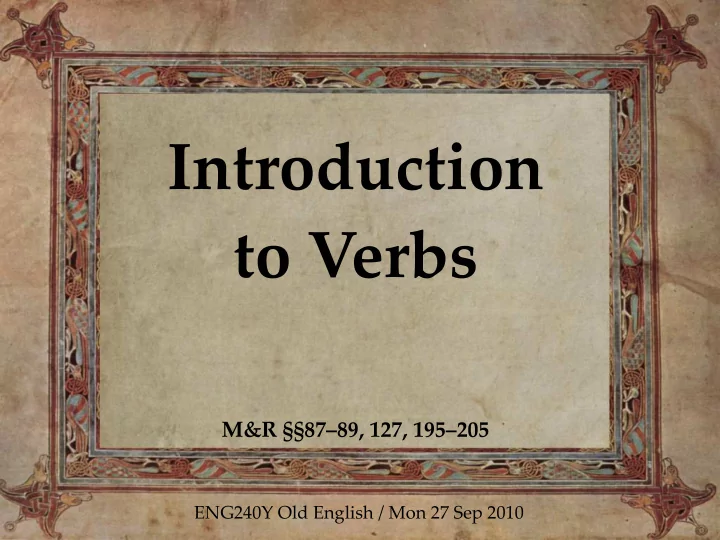

Introduction to Verbs M&R §§87–89, 127, 195–205 ENG240Y Old English / Mon 27 Sep 2010
Verb classes ● Strong: form their preterites and past participles using vowel gradation: singan > sang > sungon > sungen ● Weak: form their preterites and past participles by adding a dental suffix d / t : lǣran > lǣrde > lǣrdon > lǣred ● Anomalous: do not answer to these categories, or combine them All verb classes commonly prefix the past ptc. with ge - gesungen , gelǣred
Conjugation ● Person: first, second, third ● Number: singular, plural ● Tense: present, preterite ● Mood: indicative, subjunctive, imperative
Conjugation ● Person: first, second, third ● Number: singular, plural ● Tense: present, preterite ● Mood: indicative, subjunctive, imperative ic fremme wē fremmað þū fremest gē fremmað hē fremeð hīe fremmað Cf. early Modern English ‘I do, thou dost, he doth’
Conjugation ● Person: first, second, third ● Number: singular, plural ● Tense: present, preterite ● Mood: indicative, subjunctive, imperative ic fremme wē fremmað þū fremest gē fremmað hē fremeð hīe fremmað
Conjugation ● Person: first, second, third ● Number: singular, plural ● Tense: present, preterite ● Mood: indicative, subjunctive, imperative ic fremme wē fremmað þū fremest gē fremmað hē fremeð hīe fremmað ic fremede wē fremedon þū fremedest gē fremedon hē fremede hīe fremedon
Conjugation ● Person: first, second, third ● Number: singular, plural ● Tense: present, preterite ● Mood: indicative, subjunctive, imperative ic singe wē singað þū singest gē singað hē singeð hīe singað ic sang wē sungon þū sunge gē sungon hē sang hīe sungon
Tense ● OE present : MnE present, future (simple/continuous) ● OE preterite: MnE past, present perfect, past perfect (simple/continuous) ● resolved tenses: habban / bēon /modal + participle/infinitive - ic fremme - ic fremede - ic hæbbe gefremed - ic hæfde gefremed - þæt wæs gefremed - hē sceal fremman - is fela tō fremmenne
Conjugation ● Person: first, second, third ● Number: singular, plural ● Tense: present, preterite ● Mood: indicative, subjunctive, imperative - Hēo fremeþ þæt - Ic wille, þæt hēo fremme þæt (cf. ‘that she do that’) - Ic wille, þæt wē fremmen þæt - Ic wolde, þæt hēo fremede þæt - Ic wolde, þæt wē fremeden þæt - Freme þæt! - Fremmaþ þæt!
Voice ● NB: no inflectional passive, and hence no voice. Passivity can still be expressed: - through bēon or wēorðan + past participle: Hē wēarð ācenned Se cāsere wæs ofslagen - through impersonal man with an active verb: Man brohte his hēafod on ānum disce Man gehalgode twēgen biscopas (cf. German man and, more distantly, MnE one ) - NB the verb hātan can be used as a true passive verb: Saga hwæt ic hātte ( cf. Sum consul Boetius wæs hāten , formed with bēon)
bēon ● originally three verbs: bēon , * es- , wesan ● two common conjugations of the present: eom , bēo present ind. 1 present ind. 2 present subj. 1 present subj. 2 ic eom ic bēo ic sīe ic bēo þū eart þū bist wē sīen wē bēon hē is hē biþ wē sind wē bēoþ preterite ind. preterite subj. imperative 1 imperative 2 ic wæs ic wǣre wes bēo þū wǣre wē wǣren wesaþ bēoþ hē wæs wē wǣron
Recommend
More recommend